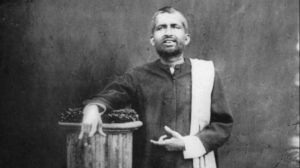
– Swami Vivekananda
The following advice of Swami Vivekananda has been taken from his lecture: Work and Its Secret which is found in the Complete Works of Swami Vivekananda Volume 2. This volume can be purchased from the Advaita Ashram bookstore.
We must learn that nothing can happen to us, unless we make ourselves susceptible to it. I have just said, no disease can come to me until the body is ready; it does not depend alone on the germs, but upon a certain predisposition which is already in the body.
We get only that for which we are fitted. Let us give up our pride and understand this, that never is misery undeserved. There never has been a blow undeserved: there never has been an evil for which I did not pave the way with my own hands.
We ought to know that. Analyse yourselves and you will find that every blow you have received, came to you because you prepared yourselves for it. You did half, and the external world did the other half: that is how the blow came. That will sober us down.
At the same time, from this very analysis will come a note of hope, and the note of hope is: “I have no control of the external world, but that which is in me and nearer unto me, my own world, is in my control.
If the two together are required to make a failure, if the two together are necessary to give me a blow, I will not contribute the one which is in my keeping; and how then can the blow come? If I get real control of myself, the blow will never come.”
We are all the time, from our childhood, trying to lay the blame upon something outside ourselves. We are always standing up to set right other people, and not ourselves.
If we are miserable, we say, “Oh, the world is a devil’s world.” We curse others and say, “What infatuated fools!” But why should we be in such a world, if we really are so good? If this is a devil’s world, we must be devils also; why else should we be here? “Oh, the people of the world are so selfish!” True enough; but why should we be found in that company, if we be better? Just think of that.
(Note: What Swami Vivekananda means here is that there are shortcomings within us too. Hence we have no right to criticize others.)
We only get what we deserve. It is a lie when we say, the world is bad and we are good. It can never be so. It is a terrible lie we tell ourselves.
This is the first lesson to learn: be determined not to curse anything outside, not to lay the blame upon any one outside, but be a man, stand up, lay the blame on yourself. You will find that is always true. Get hold of yourself.
Is it not a shame that at one moment we talk so much of our manhood, of our being gods — that we know everything, we can do everything, we are blameless, spotless, the most unselfish people in the world; and at the next moment a little stone hurts us, a little anger from a little Jack wounds us — any fool in the street makes “these gods” miserable!
Should this be so if we are such gods? Is it true that the world is to blame? Could God, who is the purest and the noblest of souls, be made miserable by any of our tricks? If you are so unselfish, you are like God. What world can hurt you? You would go through the seventh hell unscathed, untouched.
But the very fact that you complain and want to lay the blame upon the external world shows that you feel the external world — the very fact that you feel shows that you are not what you claim to be.
You only make your offence greater by heaping misery upon misery, by imagining that the external world is hurting you, and crying out, “Oh, this devil’s world! This man hurts me; that man hurts me! ” and so forth. It is adding lies to misery.
We are to take care of ourselves — that much we can do — and give up attending to others for a time. Let us perfect the means; the end will take care of itself.
For the world can be good and pure, only if our lives are good and pure. It is an effect, and we are the means. Therefore, let us purify ourselves. Let us make ourselves perfect.
Moral: So what Swami Vivekananda is trying to tell us is that though the outside world may be bad, we must not let it affect the calmness of our mind. We must not let the harsh words and criticisms of others harm our self-confidence. Neither must we try to return anger for anger, hurtful words for hurt, selfish conduct for selfishness. Instead a yogi practices remaining calm, undisturbed and unaffected by the bad behaviour of others. The Yogi continues to walk on the path of nobility, doing good to others.








